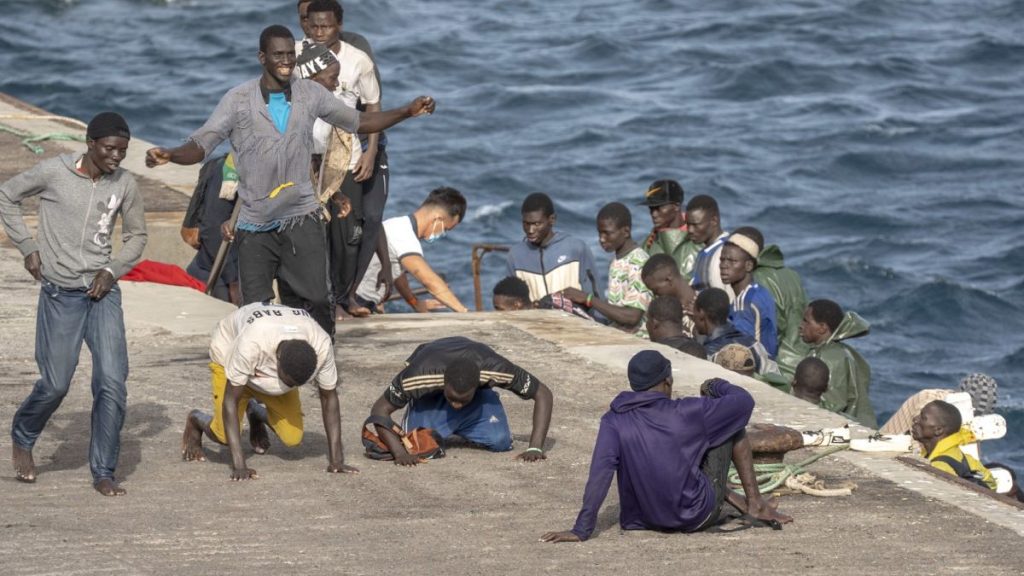The Canary Islands, a Spanish archipelago off the coast of West Africa, has become a focal point of Europe’s ongoing migration crisis. In the first days of 2025, hundreds of migrants arrived on the islands of Lanzarote and El Hierro, a stark reminder of the persistent influx of people seeking refuge or better opportunities in Europe. These new arrivals, comprising men, women, and children, primarily from sub-Saharan Africa and North Africa, highlight the complex and multifaceted challenges facing both the islands and the wider European Union. Their arrival follows a record-breaking year in 2024, which saw over 43,000 migrants landing in the Canary Islands, surpassing the numbers witnessed during the 2006 “Cayuco crisis.” The strain on local resources, including temporary housing and social services, is evident, with authorities forced to erect temporary shelters and provide basic necessities like mattresses to accommodate the influx.
The recent surge in migrant arrivals in the Canary Islands underscores the broader migration trends affecting Europe. In 2024, Spain registered a significant increase in irregular arrivals, reaching over 63,970 individuals, a 12.5% rise compared to the previous year. This escalating trend has spurred debate and policy shifts within the European Union. A rightward shift in European politics, particularly after the June 2024 EU elections, has led many member states to re-evaluate their migration policies, prioritizing border control and stricter measures to address the perceived challenges posed by migration. The issue has risen to the top of the European Council’s agenda, prompting discussions and proposals for a more coordinated and comprehensive approach to managing migration flows.
European Commission President Ursula von der Leyen has proposed accelerating the return of asylum seekers and exploring the possibility of establishing detention centers in third countries. This proposal, influenced by Italian Prime Minister Giorgia Meloni’s agreement with Albania, reflects a growing trend towards externalizing migration management. By transferring asylum seekers to countries outside the EU, the aim is to reduce the burden on member states and deter future migration. This approach, however, raises concerns about human rights and the potential for exploitation and abuse in these third-country centers. The feasibility and ethical implications of such a policy remain subjects of intense debate and scrutiny.
The Spanish government’s response to the escalating situation includes the establishment of an emergency reception center at Ciudad Real airport, aimed at processing asylum requests from irregular arrivals. This measure reflects the Spanish government’s efforts to manage the influx of migrants while simultaneously adhering to international legal obligations regarding asylum seekers. However, the sheer volume of arrivals continues to strain resources and pose logistical challenges. The situation is particularly acute regarding unaccompanied minors, who require specialized care and protection. Authorities in the Canary Islands have issued urgent appeals for increased humanitarian assistance, recognizing the vulnerability of these young migrants and the pressing need to provide them with adequate support and safeguards.
The Canary Islands’ experience mirrors broader challenges faced by frontline states in managing migration flows. The geographical proximity of the islands to the African continent makes them a natural landing point for those attempting the perilous journey across the Atlantic. The increased number of arrivals has put immense pressure on local infrastructure and resources, leading to concerns about overcrowding, inadequate housing, and the potential for social tensions. The complex interplay of geographical factors, socio-economic disparities, and political instability in various African countries contributes to the persistent flow of migrants seeking refuge and better prospects in Europe.
The migration crisis is a complex and multifaceted issue with no easy solutions. It requires a coordinated and comprehensive approach involving collaboration between European Union member states, African countries of origin and transit, and international organizations. While border control and security measures are important aspects of migration management, addressing the root causes of migration, such as poverty, conflict, and lack of opportunities, is crucial for achieving long-term solutions. Equally important is upholding the human rights and dignity of all migrants, regardless of their status, and ensuring access to essential services like healthcare, education, and legal assistance. The situation in the Canary Islands serves as a stark reminder of the urgent need for a humane and effective migration policy at both the national and European levels.

